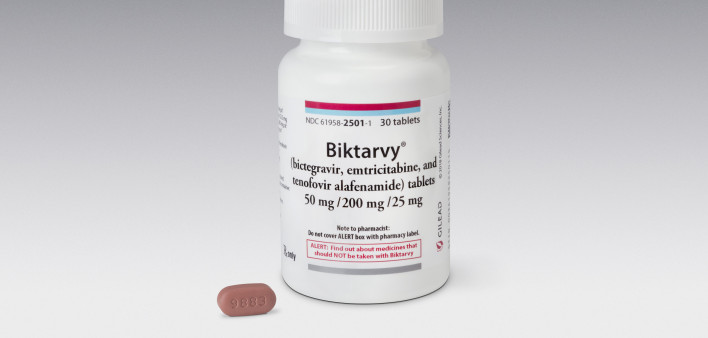People with HIV who switch their antiretroviral (ARV) regimen to Biktarvy (bictegravir/tenofovir alafenamide/emtricitabine) maintain a high rate of viral suppression and low rates of adverse health events and do not develop drug resistance over a long period, according to recent clinical trials.
Researchers presented findings from multiple studies of Biktarvy at the virtual HIV Drug Therapy Glasgow meeting last week.
Study 1878 enrolled people with HIV who had a fully suppressed viral load thanks to treatment with a boosted protease inhibitor–based ARV regimen including Reyataz (atazanavir) or Prezista (darunavir) plus either Truvada (tenofovir disoproxil fumarate/emtricitabine) or Epzicom (abacavir/lamivudine). The participants were then switched to Biktarvy.
The study followed participants for up to 156 weeks and found that they maintained a high level of viral suppression and their virus developed no new drug resistance.
The treatment was generally well tolerated, with minimal changes to kidney function, blood lipids and weight through the 96-week mark. The most common drug-related adverse health event was headache (2% reported this).
The Glasgow meeting also saw a report from six studies that looked at people who switched to Biktarvy and who had the most common treatment-related drug resistance mutations to their virus, known as M184V and M184I. There were data on drug resistance in 1,824 people, among whom 182 (10%) had M184V or M184I. Among those participants, 179 (98%) maintained a fully suppressed viral load through their last study visit, which took place 24 to 156 weeks after they switched to Biktarvy.
The virtual meeting also heard new findings from a Phase IIIb open-label trial of 86 people age 65 and older who switched to Biktarvy from Genvoya (elvitegravir/cobicistat/tenofovir alafenamide/emtricitabine) or a tenofovir disoproxil fumarate–based regimen. The participants maintained a high level of viral suppression through 72 weeks. None of their HIV developed treatment-related drug resistance.
Lastly, the meeting heard findings from the observational, real-world global BICSTaR study of 1,400 people living with HIV in Germany, Canada, France and the Netherlands. Of the 513 participants who completed one year of Biktarvy treatment, 100% of the 74 people who had never been treated for HIV had a fully suppressed viral load, as did 96% of the 357 people who switched to Biktarvy from a different regimen. The treatment was generally well tolerated. None of the participants’ virus developed resistance to any of the components of Biktarvy. The most common drug-related adverse health events were gastrointestinal symptoms (2% of participants) and neuropsychiatric problems (4%).
To read a press release about the BICSTaR study, click here.







3 Comments
3 Comments